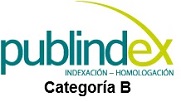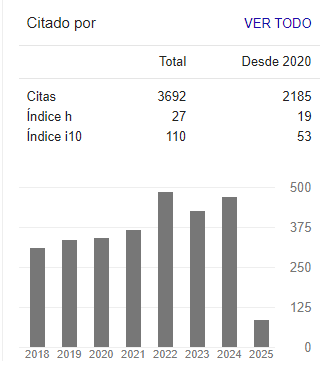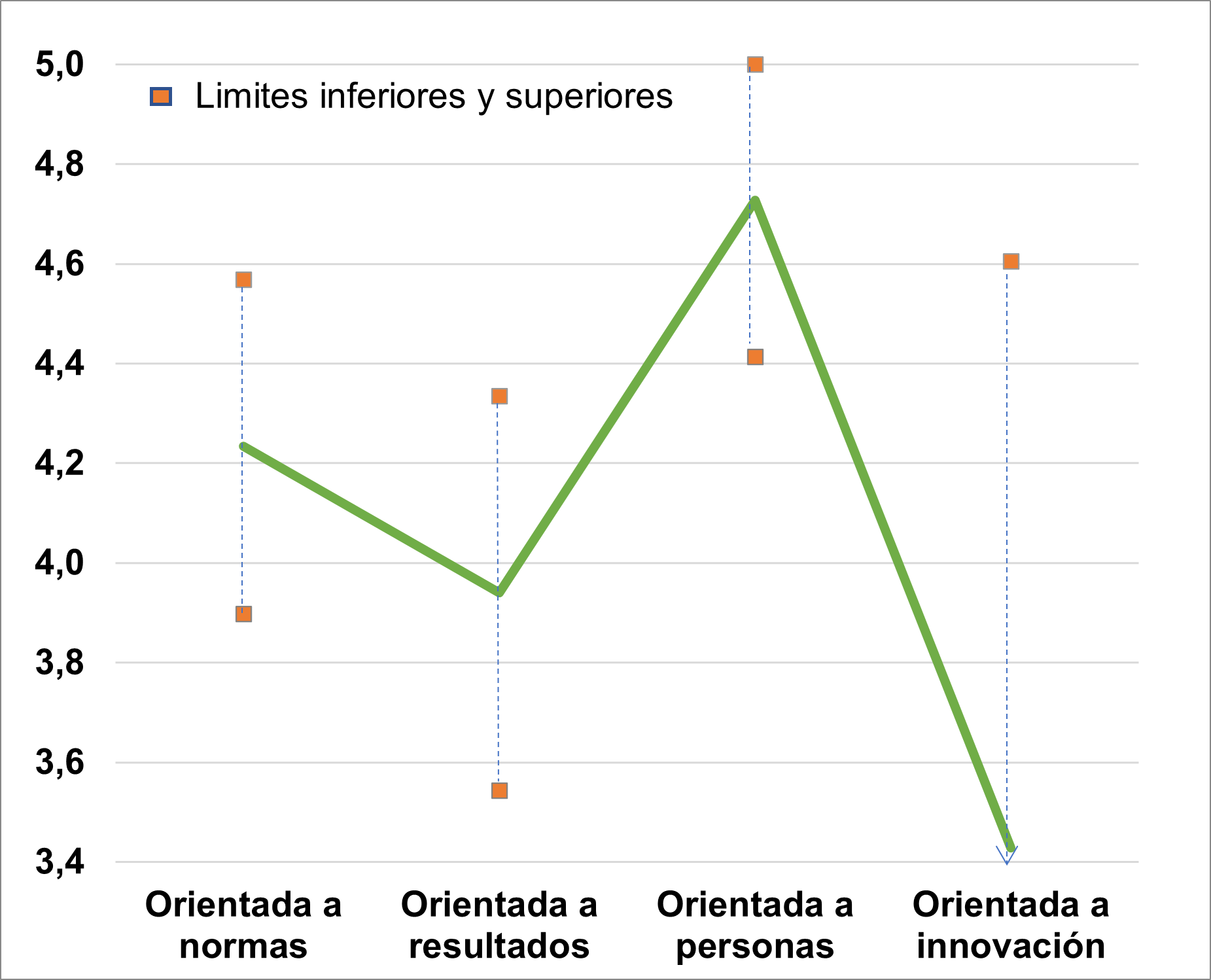
DOI:
https://doi.org/10.14483/23448393.19289Published:
2023-10-02Issue:
Vol. 28 No. 3 (2023): September-DecemberSection:
Mechanical EngineeringRequerimientos de habilidades blandas en el sector de ingeniería: el caso de la industria de ingeniería mecánica
Soft Skills Requirements for the Engineering Sector: The Case of the Mechanical Engineering Industry
Keywords:
soft skills, soft skills requirements in businesses, soft skills in engineering (en).Keywords:
habilidades blandas, requerimientos empresariales de habilidades blandas, habilidades blandas en ingeniería (es).Downloads
References
Linkedln, “Global talent trends 2019,” 2019. [Online]. Available: https://business.linkedin.com/content/dam/me/business/en-us/talent-solutions/resources/pdfs/global_talent_trends_2019_emea.pdf
H. H. F. Fore and R. E. Moritz, “Reimaginar el futuro de las habilidades: ¿qué piensan los jóvenes?,” Foro Económico Mundial, 2020. [Online]. Available: https://es.weforum.org/agenda/2020/07/reimaginar-el-futuro-de-las-habilidades-que-piensan-los-jovenes/
N. U. CEPAL, “Perspectivas económicas de América Latina 2017: juventud, competencias y emprendimiento,” CEPAL, 2016, [Online]. Available: http://hdl.handle.net/11362/40721
O. I. Akinbobola, “Predicting innovative work behavior from soft skills and emotional demands – Abilities fit in knowledge economy,” Manag. Econ. Res. J., vol. 6, no. 3, pp. 1-8, Jul. 2020. https://doi.org/10.18639/MERJ.2020.9900013 DOI: https://doi.org/10.18639/MERJ.2020.9900013
J. A. Botke, P. G. W. Jansen, S. N. Khapova, and M. Tims, “Work factors influencing the transfer stages of soft skills training: A literature review,” Educ. Res. Rev., vol. 24, pp. 130-147, 2018. https://doi.org./10.1016/j.edurev.2018.04.001 DOI: https://doi.org/10.1016/j.edurev.2018.04.001
T. Chamorro‐Premuzic, A. Arteche, A. J. Bremner, C. Greven, and A. Furnham, “Soft skills in higher education: Importance and improvement ratings as a function of individual differences and academic performance,” Educ. Psychol., vol. 30, no. 2, pp. 221-241, Mar. 2010. https://doi.org/10.1080/01443410903560278 DOI: https://doi.org/10.1080/01443410903560278
C. I. Astudillo Yañez and F. I. Meléndez Seguel, “Análisis de las habilidades blandas de un técnico en mantenimiento aeronáutico,” undergraduate thesis, Univ. Técnica Federico St. Maria, Valparaíso, Chile, 2014. [Online]. Available: https://repositorio.usm.cl/handle/11673/49068
G. Chigó Bustos and M. Olguín Ramírez, “Competencias y habilidades blandas claves para ingenieros comerciales de la Universidad de Chile,” undergraduate thesis, Univ. Chile, Santiago, Chile, 2006, [Online]. Available: http://repositorio.uchile.cl/handle/2250/108389
K. Cohen and R. Katz, “Teaching mechanical design practice in academia,” Procedia CIRP, vol. 36, pp. 177-181, 2015. https://doi.org/10.1016/j.procir.2015.01.043 DOI: https://doi.org/10.1016/j.procir.2015.01.043
W. O. A. S. W. Ismail, N. Hamzah, I. Y. A. Fatah, and A. Zaharim, “Professional skills requirement of mechanical engineers,” IOP Conf. Series: Mat. Sci. Eng., vol. 697, no. 1, art. 12016, 2019. https://doi.org/10.1088/1757-899X/697/1/012016 DOI: https://doi.org/10.1088/1757-899X/697/1/012016
W. O. A. S. W. Ismail, N. Hamzah, I. Y. A. Fatah, and A. K. Muhammad, “The essential of engineering education involving critical thinking and problems solving skills among mechanical engineer employees,” IOP Conf. Series: Mat. Sci. Eng., vol. 697, no. 1, art. 12017, 2019. https://doi.org/10.1088/1757-899X/697/1/012017 DOI: https://doi.org/10.1088/1757-899X/697/1/012017
Acofi and U. del Norte, “Buenas prácticas de assessment en programas de ingeniería,” 2020. [Online]. Available: https://www.acofi.edu.co/wp-content/uploads/2020/06/BUENAS-PRACTICAS-ACOFI-2020.pdf
Acofi, “Lineamientos curriculares para Ingeniería Industrial en Colombia,” 2020. [Online]. Available: https://www.acofi.edu.co/wp-content/uploads/2020/11/Lineamientos-Curriculares-para-Ingenieria-Industrial-en-Colombia_ed2.pdf
S. Tem, A. Kuroda, and K. N. Tang, “The importance of soft skills development to enhance entrepreneurial capacity,” Int. Educ. Res., vol. 3, no. 3, p. 1, Jul. 2020. https://doi.org/10.30560/ier.v3n3p1 DOI: https://doi.org/10.30560/ier.v3n3p1
M. Itani and I. Srour, “Engineering students’ perceptions of soft skills, industry expectations, and career aspirations,” J. Prof. Issues Eng. Educ. Pract., vol. 142, no. 1, art. 4015005, 2016. https://doi.org/10.1061/(ASCE)EI.1943-5541.0000247 DOI: https://doi.org/10.1061/(ASCE)EI.1943-5541.0000247
J. C. Neri Torres and C. A. Hernández Herrera, “Los jóvenes universitarios de ingeniería y su percepción sobre las competencias
blandas,” RIDE. Rev. Iberoam. para la Investig. y el Desarro. Educ., vol. 9, no. 18, pp. 768-791, 2019. https://doi.org/10.23913/ride.v9i18.445 DOI: https://doi.org/10.23913/ride.v9i18.449
K. N. Tang, “Beyond employability: Embedding soft skills in higher education,” Turkish Online J. Educ. Technol. - TOJET, vol. 18, no. 2, pp. 1-9, 2019. [Online]. Available: https://files.eric.ed.gov/fulltext/EJ1211098.pdf
F. Munir, “More than technical experts: Engineering professionals’ perspectives on the role of soft skills in their practice,” Ind. High. Educ., vol. 36, no. 3, pp. 294-305, Jun. 2022. https://doi.org/10.1177/09504222211034725 DOI: https://doi.org/10.1177/09504222211034725
I. Kakepoto, A. Laghari, and G. S. Buriro, “Engineering communication skills for novice engineers: A pilot project,” Glob. Educ. Stud. Rev., vol. VII, no. I, pp. 12-19, Mar. 2022. https://doi.org/10.31703/gesr.2022(VII-I).02 DOI: https://doi.org/10.31703/gesr.2022(VII-I).02
D. Jelonek, T. Nitkiewicz, and P. Koomsap, “Soft skills of engineers in view of industry 4.0 challenges,” in Conf. Quality Prod. Improv., vol. 2, no. 1, pp. 107-116, 2020. https://doi.org/10.2478/cqpi-2020-0013
W. Teng, C. Ma, S. Pahlevansharif, and J. J. Turner, “Graduate readiness for the employment market of the 4th industrial revolution: The development of soft employability skills,” Educ. Train., vol. 61, no. 5, pp. 590-604, 2019. https://doi.org/10.1108/ET-07-2018-0154 DOI: https://doi.org/10.1108/ET-07-2018-0154
B. P. Belsches, W. Farmer, C. Jacobs, P. Krebs, S. Swygard, and E. Wilcox, "Workforce development : Soft skills training initiatives in the city of Charlottesville,” PLAN 5420: Local Economic Development, 2016. [Online]. Available: http://www.culturecurrent.com/peter/docs/Charlottesvile%20Soft%20Skills%20FINAL.pdf
G. C. A. Gang, S. I. Hashmi, and C. B. Seok, “Perceiving the importance of job-related skills in the 4th industrial revolution era from the perspectives of graduates and employers,” Int. J. Adv. Sci. Technol., vol. 29, no. 11s, pp. 702-713, 2020. [Online]. Available: http://sersc.org/journals/index.php/IJAST/article/view/20039/10183
A. Bowring, “Reappraisal and the victim-player framework: A dynamic duo for executive coaches,” in Forbes, Oct. 2020. [Online]. Available: https://www.forbes.com/sites/forbescoachescouncil/2020/10/28/reappraisal-and-the-victim-player-framework-a-dynamic-duo-for-executive-coaches/?sh=2207375b635d
Alisa Cohn, “Leading the leadership revolution at LinkedIn,” in Forbes, Nov. 2017. [Online]. Available: https://www.forbes.com/sites/alisacohn/2017/11/02/leading-the-leadership-revolution-at-linkedin/?sh=5d68dad51b9c
F. Kofman, La empresa consciente: Cómo construir valor a través de valores. Buenos Aires, Argentina: Penguin Random House Grupo Editorial Argentina, 2018.
F. Kofman, Metamanagement 3 Tomos. La Calera, Chile: GS, 2003.
O. Marrero Sánchez, R. Mohamed Amar, and J. Xifra Triadú, “Habilidades blandas: necesarias para la formación integral del estudiante universitario,” Rev. Científica Ecociencia, vol. 5, pp. 1-18, Dec. 2018. https://doi.org/10.21855/ecociencia.50.144 DOI: https://doi.org/10.21855/ecociencia.50.144
I. Zergout, S. Ajana, C. Adam, and S. Bakkali, “Modelling approach of an innovation process in engineering education: The case of mechanical engineering,” Int. J. High. Educ., vol. 9, no. 2, p. 25, Dec. 2019. https://doi.org/10.5430/ijhe.v9n2p25 DOI: https://doi.org/10.5430/ijhe.v9n2p25
S. Shekhawat, “Enhancing employability skills of engineering graduates,” in Enhancing Future Skills and Entrepreneurship. Sustainable Production, Life Cycle Engineering and Management, K. Sangwan and C. Herrmann, eds., Cham, Germany: Springer, 2020,
pp. 263-269. https://doi.org/10.1007/978-3-030-44248-4_26 DOI: https://doi.org/10.1007/978-3-030-44248-4_26
S. Prasad, M. Ehrensberger, M. P. Gibson, H. Kim, and E. A. Monaco, “Biomaterial properties of titanium in dentistry,” J. Oral Biosci., vol. 57, no. 4, pp. 192-199, Nov. 2015. https://doi.org/10.1016/j.job.2015.08.001 DOI: https://doi.org/10.1016/j.job.2015.08.001
M. J. Sousa and M. do R. Almeida, “Entrepreneurial skills development,” in Recent Advances in Applied Economics, 2014. [Online]. Available: http://www.wseas.us/e-library/conferences/2014/Lisbon/AEBD/AEBD-18.pdf
L. J. Pujol and G. E. Dabos, “Artículo de revisión satisfacción laboral: una revisión de la literatura acerca de sus principales determinantes,” Estud. Gerenciales, vol. 34, pp. 3-18, 2018. https://doi.org/10.18046/j.estger.2018.146.2809 DOI: https://doi.org/10.18046/j.estger.2018.146.2809
R. Selwyn and I. Renaud-Assemat, “Developing technical report writing skills in first and second year engineering students: A case study using self-reflection,” High. Educ. Pedagog., vol. 5, no. 1, pp. 19-29, Jan. 2020. https://doi.org/10.1080/23752696.2019.1710550 DOI: https://doi.org/10.1080/23752696.2019.1710550
R. Singh Dubey, J. Paul, and V. Tewari, “The soft skills gap: A bottleneck in the talent supply in emerging economies,” Int. J. Hum. Resour. Manag., vol. 33, no. 13, pp. 2630-2661, Jan. 2021. https://doi.org/10.1080/09585192.2020.1871399 DOI: https://doi.org/10.1080/09585192.2020.1871399
D. Chenoy, S. M. Ghosh, and S. K. Shukla, “Skill development for accelerating the manufacturing sector: the role of ‘new-age’ skills for ‘Make in India,’” Int. J. Train. Res., vol. 17, no. sup1, pp. 112–130, Jul. 2019. https://doi.org/10.1080/14480220.2019.1639294 DOI: https://doi.org/10.1080/14480220.2019.1639294
F. Kofman, Metamanagement-Tomo 3 (Filosofía): La nueva consciencia de los negocios. Buenos Aires, Argentina: Grito Sagrado, 2008.
J. Check and R. K. Schutt, “Teacher research and action research,” in Research Methods in Education, Washington DC, USA: Sage Research Methods, 2012, ch. 12, pp. 255-272. https://doi.org/10.4135/9781544307725.n12 DOI: https://doi.org/10.4135/9781544307725
A. Diego Gutiérrez, “Test de bondad de ajuste multivariante,” undergraduate thesis, Univ. Cantabria, 2018. [Online]. Available: https://repositorio.unican.es/xmlui/bitstream/handle/10902/15639/Diego+Gutierrez+Andrea.pdf;jsessionid=EF80639DED9A116498220
C33B46BF958?sequence=1
Y. C. Jaimes-Acero, A. Granados-Comba, and R. Bolívar-León, “Soft skills requirements for engineering entrepreneurship,” Rev. Fac. Ing., vol. 31, no. 59, art. e14167, 2022. https://doi.org/10.19053/01211129.v31.n59.2022.14167 DOI: https://doi.org/10.19053/01211129.v31.n59.2022.14167
M. Á. Gómez, R. F. Herrera, E. Atencio, and F. C. Munoz-La Rivera, “Key management skills for integral civil engineering education,” Int. J. Eng. Pedagog., vol. 11, no. 1, p. 64, Jan. 2021. https://doi.org/10.3991/ijep.v11i1.15259 DOI: https://doi.org/10.3991/ijep.v11i1.15259
H. Chaibate, A. Hadek, S. Ajana, S. Bakkali, and K. Faraj, “A comparative study of the engineering soft skills required by Moroccan job market,” Int. J. High. Educ., vol. 9, no. 1, p. 142, Dec. 2019. https://doi.org/10.5430/ijhe.v9n1p142 DOI: https://doi.org/10.5430/ijhe.v9n1p142
S. Ahadi and S. Kasraie, “Contextual factors of entrepreneurship intention in manufacturing SMEs: the case study of Iran,” J. Small Bus. Enterp. Dev., vol. 27, no. 4, pp. 633-657, 2020. https://doi.org/10.1108/JSBED-02-2019-0074 DOI: https://doi.org/10.1108/JSBED-02-2019-0074
M. Bucur and A. Ban, “The importance of the concept of communication among future engineers-a pre-test for a European study,” Procedia Manuf., vol. 32, pp. 348-355, 2019. https://doi.org/10.1016/j.promfg.2019.02.224 DOI: https://doi.org/10.1016/j.promfg.2019.02.224
J. Daley and B. Baruah, “Leadership skills development among engineering students in Higher Education – An analysis of the Russell Group universities in the UK,” Eur. J. Eng. Educ., vol. 46, no. 4, 528-556, Oct. 2020. https://doi.org/10.1080/03043797.2020.1832049 DOI: https://doi.org/10.1080/03043797.2020.1832049
S. Fletcher and K. R. V. Thornton, “The top 10 soft skills in business today compared to 2012,” Bus. Prof. Commun. Q., vol. 2023, art. 232949062211484, Jan. 2023. https://doi.org/10.1177/23294906221148453 DOI: https://doi.org/10.1177/23294906221148453
J. Trevelyan, “Transitioning to engineering practice,” Eur. J. Eng. Educ., vol. 44, no. 6, pp. 821-837, Nov. 2019. https://doi.org/10.1080/03043797.2019.1681631 DOI: https://doi.org/10.1080/03043797.2019.1681631
K. Tsirkas, A.-P. Chytiri, and N. Bouranta, “The gap in soft skills perceptions: A dyadic analysis,” Educ. + Train., vol. 62, no. 4, pp. 357-377, Apr. 2020. https://doi.org/10.1108/ET-03-2019-0060 DOI: https://doi.org/10.1108/ET-03-2019-0060
I. S. Rampasso, O. L. G. Quelhas, R. Anholon, M. B. Pereira, J. D. A. Miranda, and W. S. Alvarenga, “Engineering Education for Sustainable Development: Evaluation Criteria for Brazilian Context,” Sustainability, vol. 12, no. 10, art. 3947, May 2020. https://doi.org/10.3390/su12103947 DOI: https://doi.org/10.3390/su12103947
H. Valdés, C. Correa, and F. Mellado, “Proposed model of sustainable construction skills for engineers in Chile,” Sustainability, vol. 10, no. 9, art. 3093, Aug. 2018. https://doi.org/10.3390/su10093093 DOI: https://doi.org/10.3390/su10093093
P. Ponce, L. Ibarra, O. Mata, and A. Molina, “How to develop research skills among undergraduate engineering students to tackle current ongoing topics? A Smart-Grid case study,” Int. J. Electr. Eng. Educ., vol. 58, no. 2, pp. 113-141, Apr. 2021. https://doi.org/10.1177/0020720918816004 DOI: https://doi.org/10.1177/0020720918816004
Y. C. Acero, R. Suárez Castrillón, and A. M. Bolívar León, “Aspects that develop soft skills – A way for inclusion in engineering programmes,” World Trans. Eng. Technol. Educ., vol. 20, no. 1, pp. 13-18, 2022. [Online]. Available: http://www.wiete.com.au/journals/WTE&TE/Pages/Vol. 20, No.1 (2022)/02-Bolivar-Leon-R.pdf
How to Cite
APA
ACM
ACS
ABNT
Chicago
Harvard
IEEE
MLA
Turabian
Vancouver
Download Citation
Recibido: 13 de abril de 2022; Revisión recibida: 1 de marzo de 2023; Aceptado: 30 de mayo de 2023
Resumen
Contexto:
Actualmente, existe una gran demanda de profesionales con habilidades blandas altamente desarrolladas, pero no hay claridad sobre cuales son. El propósito de este artículo es determinar cuáles son las habilidades blandas que se requieren en diferentes niveles organizacionales en el sector de la ingeniería mecánica.
Metodo:
Se diseño y aplico una encuesta a 81 ingenieros mecánicos egresados de la Universidad de Pamplona. El instrumento evaluó el nivel de desarrollo de 10 habilidades blandas en el pregrado, así como el nivel requerido para un primer empleo y para un cargo técnico y uno gerencial. Las herramientas estadísticas utilizadas fueron la prueba bilateral de Kolmogorov-Smirnov, la mediana, la moda, el ANOVA de Kruskall-Wallis, y la prueba post hoc de Games-Howell.
Resultados:
Se encontró que el nivel de formación de habilidades blandas es aceptable (Me=3), específicamente para las habilidades de creatividad, negociación y comunicacion no verbal, mientras que las de exponer frente a diferentes audiencias, pensamiento crítico, reconocimiento, responsabilidad, integridad y humildad demuestran un mayor desarrollo (bueno, Me=4). Por otro lado, la escritura de informes, la competencia emocional y el pensamiento crítico son las habilidades más importantes (Me=5) para el primer empleo. Para asenso a posiciones técnicas, se requiere además habilidades relacionadas con exponer ante diferentes audiencias, el reconocimiento de los miembros del equipo de trabajo y liderazgo. Para cargos gerenciales, se requiere también la integridad, el lenguaje no verbal, la negociación, la supervisión y el emprendimiento (Me=5).
Conclusiones:
Debe potenciarse la comunicación escrita, la competencia emocional y el pensamiento crítico para dar mayor competitividad al recién egresado. En relación con los cargos técnicos y gerenciales, se necesita un mayor desarrollo de todas las 10 habilidades blandas investigadas. Los programas de pregrado y postgrado deben incluir estos nuevos requerimientos empresariales en sus currículos para incrementar la competitividad de sus egresados.
Palabras clave:
habilidades blandas, requerimientos empresariales de habilidades blandas, habilidades blandas en ingeniería.Abstract
Context:
There is currently a high demand of professionals with highly developed soft skills, but there is no clarity about which ones. The purpose of this article is to determine which soft skills are required at different organizational levels in the mechanical engineering sector.
Method:
A survey was designed and applied to 81 mechanical engineers graduated from Universidad de Pamplona. The instrument evaluated the level of development of 10 soft skills in the undergraduate program, in addition to the level required for an entry-level job as well as for a technical and an executive position. The statistical tools employed were the bilateral Kolmogorov-Smirnov test, the median, the mode, a Kruskal-Wallis ANOVA, and a Games-Howell post hoc test.
Results:
The training level regarding soft skills was found to be aceptable (Me=3), specifically for creativity, negotiation, and nonverbal communication skills, while those related to presenting before audiences, critical thinking, recognition, responsibility, integrity, and humility show greater development (good, Me=4). On the other hand, report writing, emotional competencies, and critical thinking are the most important skills (Me=5) for an entry-level job. To ascend to technical positions, those related to presenting before different audiences, the recognition of team members, and leadership are required. For managerial positions, nonverbal language, negotiation, supervision, and entrepreneurship skills are also required (Me=5).
Conclusions:
Written communication, emotional competencies, and critical thinking should be bolstered in order to provide alumni with higher competitiveness. As for technical and managerial positions, a higher development of the ten analyzed soft skills is needed. Undergraduate and graduate programs should include these new business requirements in their curricula in order to increase the competitiveness of their alumni.
Keywords:
soft skills, soft skills requirements in businesses, soft skills in engineering.Introduccion
Actualmente, las habilidades blandas son destrezas que elevan la competitividad de los profesionales y se constituyen como una necesidad apremiante para el sostenimiento de las empresas y su expansión en el mercado. LinkedIn 1 realizo un estudio con 5.000 profesionales de alto desempeño en 35 países sobre las destrezas más importantes de un profesional, enmarcando tres fundamentales: la flexibilidad en el trabajo (91 %), el anti-acoso (72 %) y la transparencia en el pago (53 %) -se observa que la de mayor impacto fue una habilidad blanda. Por otro lado, el Foro Económico Mundial 2 definió la necesidad de un fuerte desarrollo en las habilidades blandas de comunicación, pensamiento
critico y resiliencia para afrontar los retos del futuro. Así mismo, la CEPAL 3 determino que América Latina es la región donde existe una mayor brecha entre las habilidades requeridas por el sector empresarial y las ofrecidas por la fuerza laboral, aconsejando una formación de habilidades técnicas y blandas en los jóvenes que permita mayor adaptación al cambio, mejor inserción y mayor movilidad laboral. Adicionalmente, existen investigaciones a nivel internacional 4-6 y Latinoamérica 7,8 que alertan sobre el requerimiento de estas habilidades en los diferentes sectores industriales, comerciales y de servicios, además de dar cuenta de que la formación universitaria generalmente no incluye estas habilidades. En relación con la ingeniería mecánica a nivel mundial, se observa la misma reflexión 9-11. Por otro lado, la Asociación Colombiana de Facultades de Ingenieria (ACOFI) y la Universidad del Norte 12 establecieron que las habilidades blandas son necesarias para el desarrollo profesional en el sector laboral, y aconsejan su inclusión en los pensum de ingeniería 13, en aras de facilitar el diseño, el mejoramiento y la optimización de los sistemas que el profesional interviene.
Actualmente, estas habilidades tienen gran demanda en las organizaciones para potenciar la eficiencia y productividad, y se requieren para asegurar, mantener y escalar de nivel dentro de una organizacion 4,11,14-16. Sin embargo, la mayor parte de la formación en ingeniería en las instituciones de educación superior se enfoca en aspectos técnicos y deja de lado dichas habilidades. Algunos estudios han identificado esta necesidad 17 y proponen que se incluya, en el currículo de estos programas, una formación a partir de entrenamientos y que aplique metodologías de aprendizaje no habituales, con la finalidad de alinear la formación de los ingenieros con la demanda actual de las empresas 18,19. A pesar de la gran demanda de ingenieros con competencias en habilidades blandas, existe un desconocimiento sobre cuáles y que nivel de su desarrollo son necesarios según el cargo desempeñado en diferentes organizaciones, y, más aún, que significan y cuáles son las acciones concretas que las determinan. Este artículo es un aporte para esclarecer dichas dudas, y le será útil a los gerentes, especialmente de las empresas pequeñas y medianas; a los ingenieros que se desempeñan en cualquier nivel organizacional; a los programas de ingeniería y sus docentes, que empiezan a ser conscientes de dicha necesidad de formación; y a la construcción continua del conocimiento en esta área especifica del saber.
Estado del arte
En el siglo XXI, las necesidades de formación de un ingeniero se han especializado, y se requieren otras habilidades que antes solo eran necesarias a nivel gerencial. La necesidad de brindar soluciones integradas en contextos diferentes le exige al ingeniero demostrar competencia en habilidades duras-las habitualmente requeridas por su área técnica, junto con un alto conocimiento en calidad, desarrollo de procesos, diseño y dirección de sistemas complejos de ingeniería, entre otras- pero también en habilidades blandas 18. Estas últimas son necesarias para poder entender la organización y sus contextos; adaptarse a los cambios rápida y eficientemente; liderar o trabajar con equipos multidisciplinarios; negociar o comunicarse efectivamente con clientes internos, externos y proveedores; y tomar decisiones asertivas, entre otras acciones 18. Las empresas de ingeniería consideran el desarrollo de las habilidades blandas como un factor decisivo en la contratación de sus empleados, donde los mas competitivos son los que demuestran un alto desarrollo en ellas 17. Esto se debe a factores como cambios emergentes en todo nivel; la globalización 18; las nuevas tendencias de cultura organizacional basadas en personas, innovación y felicidad; las nuevas formas de marketing digital; el trabajo remoto o hibrido que se ha impulsado a partir del COVID-19; y la revolución industrial 4.0 20. Por otro lado, en relación con el análisis de la competitividad de los programas de ingeniería, las habilidades blandas deben analizarse desde diferentes puntos de vista: los estudiantes buscan experiencias educativas gratificantes en un tiempo corto y desarrollar las competencias requeridas a nivel laboral, permitiéndoles asegurar trabajos de buena calidad 18; las empresas buscan contratar egresados que demuestren competencia, i.e., profesionales experimentados y hábiles y que cuenten con destrezas adicionales 17,18; las universidades están buscando atraer estudiantes, ser financieramente exitosas y sobresalir como producto de su calidad; y la sociedad espera que sus ingenieros diseñen y desarrollen los mejores sistemas, garantizando su seguridad 18 y la sostenibilidad del medio ambiente.
Es precisamente allí donde las habilidades blandas toman su importancia como el centro de union entre los requerimientos de los diferentes actores.
Habilidades blandas
El termino habilidades blandas no está completamente definido, tanto así que estas también son referidas como habilidades sociales, emocionales, socioemocionales y no-cognitivas y como competencias genéricas, transversales o de empleabilidad, y se relacionan con actitudes, atributos, rasgos y prácticas de comportamiento personal. Dichas habilidades permiten la creación y el desarrollo de relaciones positivas, la resolución positiva de conflictos y alcanzar las metas comunes de un equipo, e influyen en como una persona enfoca su aprendizaje e interactúa con su ambiente de trabajo.
En 2010, la Universidad Goldsmith de Londres propuso un inventario de 15 habilidades blandas 6 que han sido usadas también como base en diferentes estudios relacionados con la ingeniería 4,21-23. Fred Kofman 24,25 propuso que, para que una empresa logre una alta productividad de manera sostenible 26,27, debe centrarse en la generación de valor en sus empleados. Esto se logra a través del desarrollo de siete actitudes. Con estas dos referencias como eje central, y tomando otras a partir del análisis bibliográfico, se seleccionaron 10 habilidades blandas, que se definen a continuación y se decantan en acciones específicas para su evaluación (Tabla I).
Nota: Las letras al inicio corresponden a la codificación utilizada para establecer los indicadores.
Tabla I: Criterios para medir habilidades blandas
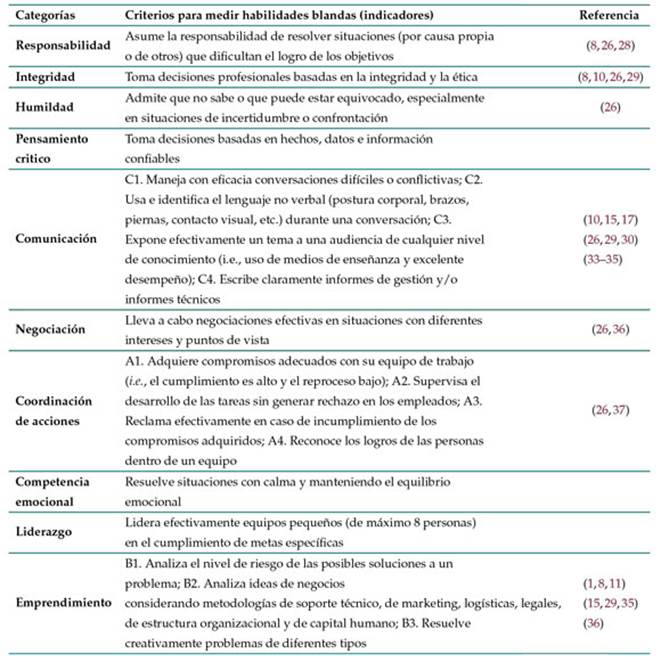
Responsabilidad: La habilidad de responder. La capacidad de dar respuesta efectiva a una situación que afecte la obtención de un resultado especifico, tomando consciencia y asumiendo como se ha contribuido a dicha situación y como se puede ayudar a solucionarla. Las personas que han desarrollado esta habilidad se identifican por el alto nivel de cumplimiento de sus compromisos, independientemente de factores externos, y por la capacidad de ser conscientes y asumir las consecuencias de sus actos. Habitualmente se esfuerzan por dar la milla de más, y retrasan la gratificación inmediata a favor de objetivos a largo plazo 8,26-28.
Integridad: Esta habilidad está asociada con las acciones orientadas por valores esenciales, y se plasma habitualmente en normas y principios socialmente aceptados. Las personas integras priman el bien colectivo sobre los intereses personales y son correctos en sus actuaciones según sus referentes, y proponen que no solo el resultado o el éxito es lo importante, sino que además las acciones que lo logran deben estar fundamentadas en valores esenciales 8,10,26,29.
Humildad: Una gran limitante del avance de una organización es que sus trabajadores crean que lo saben todo y se cierren al aprendizaje continuo. Esta habilidad se centra en la disposición de adquirir nuevos conocimientos, habilidades y destrezas para utilizarlos en el trabajo -e incluso en diferentes dominios de la vida. También está relacionada con la aceptación de la crítica y el reconocer públicamente cuando se está equivocado 8,10,26-29.
Pensamiento crítico: La capacidad para comprender, evaluar, deducir información y proponer conclusiones. Esta permite resolver problemas, tomar decisiones apropiadas, hacer suposiciones, probar la legitimidad de algo y ver situaciones desde diferentes puntos de vista. Esta habilidad es central para la toma de decisiones acertadas con el foco en un objetivo y basadas en la evidencia. Permite planificar y organizar eficazmente un equipo de trabajo y reducir el reproceso, ahorrando dinero y tiempo 10,14,17,29.
Comunicación: La capacidad de comunicarse con una amplia variedad de personas y de forma verbal, escrita y corporal. Par ello, es necesario exhibir un vocabulario amplio que permita adaptarse a los diferentes niveles de su contraparte, escribir de manera clara y leer corporalmente las emociones y la predisposición a cierto tipo de conversaciones. Esto se puede evidenciar en la escritura de reportes, presentaciones orales, blogs y publicaciones en redes sociales, así como en reuniones con compañeros en un entorno técnico o comercial. Esta habilidad ayuda a definir metodologías para afrontar conversaciones difíciles de manera eficiente 10,14,15,17,29-31.
Negociación: Esta habilidad redefine el concepto de conflicto en términos de un proceso de aprendizaje y crecimiento mutuo; determina las bases de un conflicto y lo clasifica como individual, relacional u operacional; y propone metodologías efectivas para la negociación en los diferentes tipos de conflicto que ocurren comúnmente en el trabajo en equipo.
Coordinación de acciones: Muchos de los reprocesos y problemas en los equipos radican en la falta de especificidad para hacer un compromiso, para realizar su seguimiento y, en caso requerido, expresar un reclamo o una disculpa. Esta habilidad es muy importante para mantener la motivación y el empoderamiento, incrementar la Valia personal y realizar un reconocimiento de personas o equipos. En resumen, la coordinación de acciones se define en términos de la efectividad para realizar compromisos y seguimientos y para expresar reclamos, disculpas y reconocimientos. Esta habilidad es clave para desempeñarse de manera competente y adecuada en la interacción con otros, en aras de lograr metas en común. Se puede evidenciar su desarrollo en la ejecución efectiva de proyectos de cualquier índole. Esta habilidad también permite identificar claramente los objetivos de un equipo de trabajo y orientar acciones para conseguirlos 8,10,15,17,29,30.
Competencia emocional: La habilidad para identificar y gestionar los sentimientos personales y las reacciones inconscientes ante problemas y desafíos. Este concepto realza la importancia del desarrollo emocional y, a partir de las emociones propias o de otros, permite analizar situaciones. Su desarrollo conlleva el progreso en el desempeño laboral y una mejor predisposición hacia el trabajo. Lograr un estado de maestría emocional es indispensable en el camino del crecimiento empresarial 17.
Liderazgo: Este concepto se refiriere a una persona que tiene seguidores debido a su capacidad de visualizar y concretar resultados. El líder otorga a sus subordinados la autoridad y el apoyo para tomar decisiones, utiliza y personaliza adecuadamente el reconocimiento y los incentivos, da ejemplo, se muestra consistente y mantiene altos estándares de integridad y conducta ética -incluso en situaciones difíciles-, aprende de la experiencia, incrementa su intuición a partir de los errores y analiza tanto los éxitos como los fracasos en busca de oportunidades para mejorar 10,14,15,29,30.
Emprendimiento: Se define como un sistema individual o colectivo enfocado en el desarrollo de algo nuevo, que puede ir desde la concepción de ideas hasta la creación de empresas. La capacidad emprendedora tiene cuatro componentes: la capacidad de innovar y ser creativo, la capacidad de identificar y explotar nuevas oportunidades de negocio, la capacidad y voluntad de asumir riesgos y la capacidad de crear y desarrollar redes empresariales. Esta habilidad permite generar estrategias ideales para expandir la productividad y el desarrollo general de cualquier organización 10,29,32).
La Tabla I resume algunos criterios que indican el desarrollo de habilidades blandas en miembros de un equipo de trabajo.
Metodologia
Las preguntas planteadas en esta investigación fueron las siguientes: ¿Cuáles son las habilidades blandas requeridas por las empresas de ingeniería mecánica en los diferentes niveles organizacionales? ¿Cuál es la brecha entre las habilidades blandas requeridas y las formadas durante el pregrado?
Para ello se realizó un investigación cuantitativa, usando una encuesta para recopilar información de los participantes 38, la cual se diseño teniendo en cuenta tres dimensiones.
La primera, llamada Demográfica & Empresa, consistió en determinar la demografía de la población encuestada y las características de la empresa en la que trabajaba. Esta dimensión contenía 11 preguntas que hicieron las veces de indicadores.
Las preguntas de la segunda y tercera dimensión, que median la formación en pregrado y los requerimientos de la empresa en habilidades blandas, se diseñaron a partir de los criterios definidos en la Tabla I.
La segunda dimensión, Formación en Pregrado, determino el nivel de desarrollo de estas habilidades en la formación del pregrado mediante 10 indicadores y una escala Likert de 5 puntos, con los siguientes niveles formación: 1) muy deficiente, 2) deficiente, 3) aceptable, 4) bueno y 5) excelente.
La tercera dimensión, llamada Requerimientos de la Empresa, determina la importancia de las habilidades definidas para tres niveles organizacionales: el primer empleo del ingeniero, cargos técnico-administrativos y cargos gerenciales. Esta dimensión utilizo 18 indicadores para cada nivel organizacional, para un total de 54 indicadores y una escala de Likert con los siguientes niveles: 1) sin importancia, 2) de poca importancia, 3) moderadamente importante, 4) importante y 5) muy importante.
La validez de la encuesta fue positiva según la evaluación de tres expertos, i.e., una doctora en estadística, una magister en educación certificada en diferentes orientaciones de coaching y un magister en administración. La confiabilidad del instrumento se determinó mediante el Coeficiente Alfa de Cronbach, que obtuvo una consistencia interna excelente, con un valor de α = 0, 95. En el estudio participaron 81 ingenieros egresados de la carrera de Ingeniería Mecánica del total de 210 que existían al momento de la aplicación de la encuesta, para un error calculado de 8% y una confiabilidad del 95 %.
Mediante una prueba bilateral de Kolmogórov-Smirnov, donde se obtuvo valor p < 0, 05 para todos los indicadores, se determinó que los datos son no normales y no paramétricos. Esto implica que su análisis debe realizarse desde la mediana y la moda, y los estadísticos utilizados deben aplicar para este tipo de datos (39). Por ello, el análisis estadístico utilizo herramientas no paramétricas como la mediana, la moda, el rango, un análisis de varianza (ANOVA) Kruskall-Wallis, y la prueba post hoc de Games-Howell.
Resultados
A continuación, muestran los resultados de la dimensión demográfica (Tabla II). En la Fig. 1 se muestra la impresión sobre el nivel de formacion de las habilidades blandas en pregrado (rojo) y los requerimientos de dichas habilidades para cada nivel de jerarquía organizacional investigado, i.e., primer empleo (azul), cargo técnico (naranja) y cargo gerencial (verde). Los resultados se muestran en términos de mediana y moda en lugar de media y desviación estándar, debido a que los datos son no normales y no paramétricos según prueba bilateral de Kolmogorov-Smirnov.
Tabla II: Resultados de la dimensión Demografía & Empresa
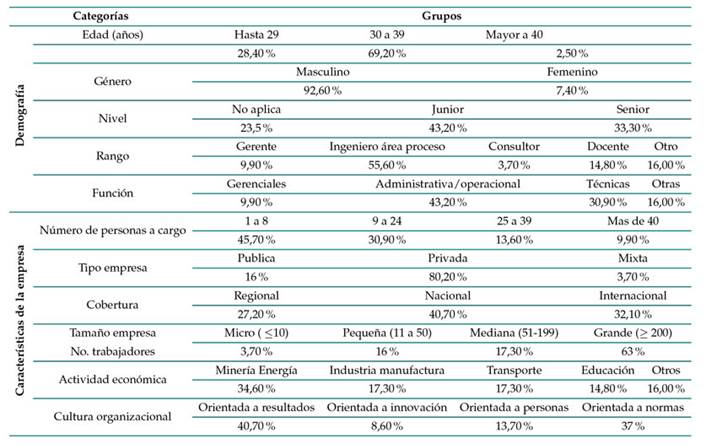
Figura 1: Desarrollo de habilidades blandas en la formacion de pregrado y nivel requerido por la empresa (a. mediana; b. moda o tendencia)
Un analisis general de los resultados mostrados a la izquierda de la Fig. 1 evidencia la necesidad inmediata de que los egresados cuenten con un desarrollo importante (Me=4) en prácticamente todas las habilidades blandas investigadas -incluso, este desarrollo debe ser muy importante (Me=5) en algunas de sus habilidades. Además, los resultados que se muestran en las Figs. 1y 2 describen un aumento en la importancia de dichas habilidades para poder acceder a niveles jerárquicos más altos. Es importante resaltar que, para un nivel gerencial, aunque solo 13 de los 18 indicadores requieren un desarrollo muy importante (Me=5), la tendencia evidenciada en la moda es que prácticamente todos son muy importantes. A continuación, se muestran los resultados obtenidos para cada uno de los niveles jerárquicos investigados.
Figura 2: Comparacion de habilidades formadas y requeridas para cada nivel jerarquico
Ingeniero recien graduado
Como se observa en las Figs. 1 y 2, las tres habilidades que son muy importantes (Me=5) para el primer empleo son comunicación (específicamente escribir informes técnicos), competencia emocional y pensamiento crítico. La moda de 10 indicadores corresponde al valor “muy importante” (Mo=5). De esto se infiere que, además de las tres habilidades mencionadas, las de comunicación (específicamente lenguaje no verbal y exponer frente a diferentes audiencias), la coordinación de acciones (específicamente compromiso, reclamo y supervisión), el liderazgo y el emprendimiento (específicamente la creatividad) son importantes para incrementar la competitividad del recién graduado en su entrada a la vida profesional.
Para determinar si existía variación para este nivel jerárquico en cada uno de los grupos definidos en la dimensión demográfica (Tabla II) en relación con las habilidades blandas investigadas, se realizó un análisis no paramétrico de Kruskall-Wallis (ANOVA), donde los valores con un nivel de significancia p <0,05 definían la existencia de dicha variación. Se encontró que, entre los 11 grupos demográficos posibles, solo el tamaño de la empresa mostraba una diferencia estadística en relación con el requerimiento de habilidades blandas, es decir, dependiendo del tamaño de la empresa, se necesitan diferentes niveles de desarrollo. Para comprender con mayor profundidad este comportamiento, se aplicó una prueba bilateral post hoc de Games-Howell, cuyo resultado se muestra a la izquierda de la Fig. 3.
Figura 3: Post hoc de Games-Howell de algunas habilidades blandas (a. en relación con el tamaño de la empresa para el primer empleo; b. escribir informes técnicos en relación con cargos técnicos)
Este análisis estadístico demuestra que, para que un recién egresado tenga la posibilidad de trabajar para empresas de ingeniería de tamaños micro (≤ 10 empleados) y pequeño (entre 11 y 50), requiere un desarrollo muy importante (Me>4,5) en las habilidades de comunicación (específicamente en escritura de informes y exponer frente a diferentes audiencias) y coordinación de acciones (específicamente en reclamos), pero no así en la de negociación (Me=3,3). A su vez, si el egresado desea trabajar en empresas medianas (entre 51 y 199 empleados) los niveles de desarrollo de las habilidades descritas anteriormente son inversos, pero, para este tamaño de empresa, la habilidad de negociación aumenta en importancia (Me=3,3 y 3,7). Finalmente, si su opción es trabajar en una empresa grande (≤ 200 empleados), las cuatro habilidades deben tener un nivel de desarrollo importante (3,9<Me<4,3).
Cargos técnicos
Para un cargo de ingeniería en una posición técnica (Figs. 1 y 2), i.e., ingeniero de proyectos, de área o de procesos, se requiere un nivel muy importante (Me=5) en seis habilidades blandas, incluyendo las tres definidas para el primer empleo y adicionando las de comunicación (exponer frente a diferentes audiencias), coordinación de acciones (reconocimiento) y liderazgo. Otras diez habilidades que tienden a requerir un desarrollo muy importante (Mo=5) son la integridad, la humildad, la coordinación de acciones (negociación) y el emprendimiento (análisis de nivel de riesgo y aplicación de metodologías de emprendimiento). Al ocupar un cargo técnico, los requerimientos de habilidades blandas exigen al ingeniero una mayor efectividad en las presentaciones a audiencias de diferentes niveles jerárquicos (superiores, pares y personal técnico a cargo). Además, estos profesionales empiezan a hacerse cargo de equipos de trabajo más grandes y complejos, y deben tener habilidades para liderarlos, reconocer sus resultados públicamente tanto a nivel individual como grupal, coordinar acciones generando compromisos sostenibles, realizar supervisión sin predisponer al personal, y, en caso de incumplimiento, realizar reclamos efectivos que no minen las relaciones interpersonales. Esto se evidencia en el valor “muy importante” de la moda (Mo=5) para dichas habilidades. Además de liderar personal, los ingenieros en este cargo empiezan a involucrarse en el mejoramiento de la producción de la empresa o el diseño de nuevos productos y servicios, y es allí donde aparece la habilidad de emprendimiento, específicamente en relación con el análisis de riesgo para toma de decisiones y el conocimiento de metodologías asociadas con aspectos técnicos, organizacionales, de marketing, logísticos, entre otros que permiten mejorar o crear productos o servicios en una empresa.
Al realizar un análisis de Kruskall-Wallis (ANOVA), entre todos los indicadores demográficos y de habilidades blandas, únicamente el nivel de ingeniero (ninguno, junior o senior), mostro una diferencia estadística (p<0,05) en la habilidad de comunicación, específicamente en la escritura de informes. Se realizo la prueba post hoc de Games-Howell, encontrando lo que se muestra a la derecha de la Fig. 3: no existe diferencia estadística en los requerimientos de escritura de informes para un ingeniero no catalogado o junior, pero si entre estos dos y un ingeniero senior, aunque dicha diferencia es pequeña.
Cargos gerenciales
Como se observa en las Figs. 1y 2, las siete habilidades blandas que deben desarrollarse completamente para ascender a cargos gerenciales además de las seis que requiere el cargo técnico- son la integridad, la comunicación (específicamente el lenguaje no verbal), la coordinación de acciones (específicamente la negociación y la supervisión) y el emprendimiento con todos sus indicadores 40. Las funciones principales de este cargo, i.e., mantener y expandir la compañía, giran en torno a las habilidades de comunicación y se apoyan en la integridad, las cuales, aunque se requieren también en niveles jerárquicos inferiores, para este cargo son indispensables. Con respecto a la comunicación, los dos indicadores que no requerían un alto desarrollo en el cargo previo eran las conversaciones difíciles y el lenguaje no verbal, y, aunque este último tiene una tendencia a ser muy importante desde el primer empleo, solo hasta el cargo gerencial aparece con un alto requerimiento, lo cual es entendible, pues, a este nivel organizacional, el lenguaje corporal permite leer la predisposición emocional de la contraparte para las conversaciones y expresarse de manera asertiva con el cuerpo. Así mismo, la habilidad de negociación incrementa su exigencia, pues se convierte en una herramienta fundamental para que el gerente cierre acuerdos satisfactorios con proveedores, clientes, lideres de trabajadores y, en algunos casos, competidores. La satisfacción de todas las partes una vez se cierra una negociación es un indicativo del futuro de la relación entre ellas. Con respecto a la supervisión, aunque también tiende a ser muy importante desde el primer empleo, para este caso se requiere que su desarrollo este completo; a este nivel jerárquico, las no conformidades o los resentimientos personales por supervisiones mal dirigidas permean prácticamente toda la organización, incrementando los reprocesos con sus costos asociados y generando un clima organizacional tenso. Finalmente, en relación con la creatividad, este nivel jerárquico es el que direcciona y financia la innovación en la compañía en el ámbito de la mejora o la creación de productos o servicios, por lo cual se exige el máximo desarrollo en esta habilidad.
El análisis de Kruskall-Wallis (ANOVA) mostro que, de todos los indicadores demográficos, únicamente el tipo de cultura organizacional (orientada a resultados, normas, personas o innovación) tenía diferencia estadística (p<0,05) con la habilidad de comunicación, específicamente en la escritura de informes. Según la prueba post hoc de Games-Howell (Fig. 4), en organizaciones con culturas orientadas tanto a normas como a resultados, la exigencia en la escritura de informes es importante (Me=4,2 y 3,9), mientras que, en aquellas con una orientación hacia las personas, esta habilidad es más valiosa (muy importante, Me=4,7). En organizaciones orientadas a la innovación, existe una gran dispersión de los resultados, y no puede definirse una tendencia estadísticamente.
Figura 4: Post hoc de Games-Howell para la escritura de informes técnicos en relación con la cultura organizacional en cargos gerenciales
Formacion de habilidades blandas en pregrado
Los encuestados egresados del programa de Ingeniería Mecánica de la Universidad de Pamplona evaluaron el desarrollo de sus habilidades blandas en la formación de pregrado como “aceptable” (Me=3). En la Fig. 1 se puede apreciar la variación entre el nivel de formación en el pregrado y los requerimientos en cada nivel organizacional. Se evidencia que las habilidades como la responsabilidad, la integridad, la humildad, la comunicación (específicamente exponer frente a diferentes audiencias),
la coordinación de acciones (específicamente el reconocimiento y el pensamiento crítico) son las más desarrolladas (con un buen nivel de formación, Me=4), mientras que otras habilidades como la comunicación, la negociación en coordinación de acciones, la competencia emocional, el liderazgo y el emprendimiento muestran un nivel de formación aceptable (Me=3).
Como puede apreciarse (Fig. 1), la habilidad de comunicación comprende cuatro habilidades específicas, pero solo el indicador de exponer frente a diferentes audiencias se valoró con un buen nivel (Me=4), mientras que las otras tres son aceptables (Me=3). Incluso el indicador de lenguaje no verbal y la negociación tienden a estar (moda) a un nivel de formación deficiente (Mo=2). Estos resultados demuestran que, en la formación de pregrado, solo cinco indicadores de los 18 medidos (28% de lo requerido), están al nivel que requiere un recién egresado. Esta diferencia aumenta al ascender de nivel jerárquico en la empresa, donde, para un cargo técnico, solo se forman tres habilidades (17% de lo requerido) y para el gerencial solo dos (11% de lo requerido) al nivel que se exige (Fig. 2). Estos resultados brindan evidencia concreta sobre la brecha entre las habilidades blandas requeridas por las empresas y las formadas durante el pregrado, lo cual ha sido mencionado por diferentes autores.
Discusión
El objetivo de este trabajo fue determinar cuáles son las habilidades blandas que requiere un ingeniero mecánico en empresas de ingeniería en diferentes niveles organizacionales, así como cuál es la brecha entre este requerimiento y su formación en el pregrado.
En relación con la primera pregunta de investigación (. ¿Cuáles son las habilidades blandas requeridas por las empresas de ingeniería mecánica en los diferentes niveles organizacionales?), los resultados muestran claramente los requerimientos, las tendencias y la variación para los niveles organizacionales. Al igual que lo encontrado por otros autores, se evidencio empíricamente una preponderancia (Me=5) de tres habilidades: comunicación 10,17-19,41-44, pensamiento critico y competencia emocional 41. Sin embargo, otros investigadores tambien han encontrado la creatividad 10,17,43, el liderazgo 41,43-45, la productividad, el autoaprendizaje 41) y la interacción multidisciplinaria en equipos de trabajo 10,18,41,44. Los indicadores homólogos de estas habilidades en este trabajo (autoaprendizaje ∼= humildad, interacción multidisciplinaria e interacción con equipos de trabajo ∼= coordinación de acciones) no eran muy importantes para el primer empleo, pero si constituyen necesidades para el ascenso en la jerarquía organizacional. Esta investigación también encontró que, de 18 indicadores para las diez habilidades blandas analizadas, quince de ellos son importantes (Me=4) para el primer empleo. Para ascender a un cargo técnico, además de las requeridas para el primer empleo, se suman las habilidades de comunicación (exponer frente a diferentes audiencias), las de coordinación de acciones (reconocimiento de equipos de trabajo) y las de liderazgo. Para un cargo gerencial, las diez habilidades blandas y sus 18 indicadores tienden requerir un desarrollo completo (Mo=5). Algunos autores han determinado que las habilidades más importantes en cargos directivos en áreas de ingeniería son aquellas relacionadas con la organización de equipos, la gestión de proyectos, la gestión de compromisos y la resolución de problemas 41,46, coincidiendo con lo encontrado en esta investigación en relación con las habilidades de coordinación de acciones, liderazgo, comunicación y negociación. Sin embargo, como se evidencia empíricamente este trabajo, para este nivel organizacional es necesario el desarrollo de prácticamente todas las habilidades blandas.
La relevancia de la habilidad comunicativa en los tres niveles jerárquicos, demostrada en este estudio y por otros investigadores 10,17-19,41-44, hace necesario priorizar su desarrollo. Esta habilidad es esencial en los profesionales recién graduados y en todos los niveles organizacionales; es necesaria para el desarrollo de la personalidad, en ambientes de cooperación y coordinación necesarios en proyectos de ingeniería, para interactuar efectivamente con equipos de trabajo, personas de diferente nivel jerárquico, clientes y proveedores 18 y para intercambiar diferentes puntos de vista. Un desarrollo inadecuado da la impresión que el profesional no ha sido entrenado apropiadamente y que sus conocimientos son pobres en el área técnica 19, lo cual disminuye su competitividad. Por otro lado, la industria 4.0 requiere de profesionales que tengan esta habilidad fuertemente desarrollada 44,47, además de otras como la facilidad de comunicación en otros idiomas, el trabajo en equipo y el liderazgo 44.
Respecto a la pregunta. ¿Cuál es la brecha entre las habilidades blandas requeridas y las formadas durante el pregrado?, se encontró que la formación de dichas habilidades, aunque es aceptable según los encuestados, no cumple con el nivel exigido para el primer empleo; solo el 28% de los indicadores está al nivel exigido, guardando coherencia con la brecha entre la formación universitaria y lo requerido en la industria que se sugiere en prácticamente toda la bibliografía consultada. Incluso algunos autores han señalado de manera puntual las carencias en liderazgo, emprendimiento, habilidades personales 4,35, comunicación, profesionalismo y responsabilidad 4,48 de los profesionales recién graduados, lo cual coincide con lo encontrado en esta investigación. Si se analizan los requerimientos para un nivel superior en la organización, como el de una posición técnica en ingeniería, la brecha se torna más grande, pues aparecen nuevas exigencias en el desarrollo de habilidades (i.e., exponer frente a diferentes audiencias, el reconocimiento, y el liderazgo). Adicionalmente, en posiciones gerenciales, se exigen precisamente aquellas habilidades que muestran un menor desarrollo en el pregrado.
El nivel de desarrollo de habilidades blandas en los programas universitarios puede variar según la institución, el programa específico y el desarrollo económico del país. En general, este nivel de desarrollo depende de las prioridades y los recursos de la institución. En instituciones educativas que no se han desarrollado adecuadamente y apuntan a mejorar la competitividad de sus egresados, es indispensable que se entrene a los docentes en este tipo de habilidades 35,49, en aras de integrarlas a sus estrategias pedagógicas o desarrollar otras 50. Además, en sus pensum, los programas deben incluir materias específicas orientadas al desarrollo de estas habilidades, utilizando diferentes metodologías de enseñanza 51 como la experiencial-vivencial 52. Esto aseguraría una mayor competitividad en los recién egresados, así como una curva de aprendizaje mucho menor para el ascenso dentro de una organización, con la posibilidad de acceder a puestos gerenciales en menor tiempo.
Finalmente, como aportes de esta investigación, puede listarse lo siguiente, primero, estos resultados empíricos sirven de brújula para que los ingenieros de cualquier nivel y los estudiantes de programas de ingeniería puedan determinar las habilidades que deben desarrollar según su proyección profesional y, a partir de ello, realizar entrenamientos que lleven a su crecimiento.
Segundo, para los programas de ingeniería que estén preguntándose que otros elementos deben contener una formación de profesionales que responda a las nuevas tendencias globales y cuál es el camino para mejorar su competitividad, se abre una posibilidad concreta de crecimiento en el desarrollo de las habilidades blandas definidas en esta investigación, lo cual implica, a su vez, el desarrollo de dichas habilidades en sus docentes. Esta formación puede darse a partir de reformas curriculares, de cambios en los contenidos programáticos o incluso a través de actividades extracurriculares, tales como cursos de formación específicos, participación en proyectos de capítulos de organizaciones internacionales, participación en eventos de semilleros de investigación o actividades interdisciplinarias cuyo enfoque implique el desarrollo de alguna de las habilidades mencionadas. El cómo incluir esta formación en los programas dependerá del nivel que ellos definan desarrollar y los recursos que destinen. Una decisión orientada a incrementar estas habilidades en los niveles descritos en este articulo les brindara a futuros egresados mayores opciones en el mundo laboral, mayor facilidad y menor tiempo de aprendizaje de dichas habilidades y, por ende, la posibilidad de ascensos más rápidos dentro de las organizaciones.
Tercero, una de las principales limitantes para comprender la necesidad de habilidades blandas para la formación en el área de ingeniería es que existe un alto desconocimiento sobre su conceptualización, que debería incluir tanto las acciones con que ellas se definen como las maneras de medir su desarrollo. Este trabajo propone y conceptualiza diez habilidades blandas, algunas de ellas con subdivisiones, y define acciones concretas que pueden ser utilizadas para diseñar diferentes instrumentos de medición, como la encuesta aplicada en esta investigación, ayudando a llenar el mencionado vacío de conocimiento.
Cuarto, a partir de los análisis realizados, se puede afirmar que, si bien existe una tendencia general en algunas de las habilidades blandas especificadas, se evidencia que algunas situaciones asociadas a la demografía implican variaciones en el nivel de desarrollo requerido. Se definió que el nivel de desarrollo de algunos indicadores de las habilidades de comunicación y coordinación de acciones depende del tamaño de la empresa, la cultura organizacional y el nivel jerárquico.
Quinto, a pesar de que diferentes autores mencionan una brecha entre lo requerido por las industrias y lo impartido por la academia, esta no está claramente definida. Nuestra investigación define específicamente las habilidades blandas que conforman esta brecha, encontrando que, solo comparado con el primer empleo, existe una brecha del 72% en las habilidades blandas requeridas. A medida que se escala en la jerarquía organizacional, esta brecha incrementa.
Conclusiones
Se logro identificar las habilidades blandas necesarias para tres niveles jerárquicos organizacionales en el área de la Ingeniería Mecánica: para un primer empleo, escribir informes técnicos, competencia emocional y pensamiento crítico; para un cargo técnico, las habilidades anteriores más las de integridad, humildad, negociación y emprendimiento; y, para un cargo gerencial, prácticamente todas las habilidades investigadas.
Se encontró que hay una variación en la exigencia del desarrollo de algunas habilidades dependiendo del tamaño y cultura de la organización. Respecto al tamaño, se encontró que, en el caso de los recién graduados, para las micro- y pequeñas empresas se requiere un mayor desarrollo en la escritura de informes, en la habilidad de exponer frente a diferentes audiencias y en la expresión de reclamos. Entretanto, para las empresas medianas, la habilidad de negociación adquiere mayor importancia y, para grandes empresas, estas cuatro habilidades requieren un nivel de desarrollo alto. En relación con la cultura organizacional, se encontró que, para los cargos técnicos, en las empresas orientadas a normas o a resultados, la habilidad de escribir informes técnicos es más demandante que para las organizaciones orientadas a personas.
La brecha entre las habilidades blandas desarrolladas en el pregrado y las requeridas para un primer empleo es bastante grande; solo el 28% de las habilidades muestran el desarrollo requerido. En este sentido, los programas deben enfocarse en mejorar el nivel de dichas habilidades y, dependiendo de la competitividad que deseen conferirles a sus egresados, pueden desarrollar en primera instancia las habilidades comunicativas, de competencia emocional y de pensamiento crítico. En segunda instancia, pueden incluir la habilidad de exponer frente a diferentes audiencias, el reconocimiento, y el liderazgo. Cabe añadir que, en tercera instancia, deben desarrollarse todas las habilidades analizadas en este estudio.
Los programas de pregrado y postgrado deben formar a sus docentes en estas habilidades para que puedan incorporarlas en sus diferentes estrategias de enseñanza, además de incluir espacios de enseñanza específicos en sus pensum que utilicen metodologías de enseñanza-aprendizaje experiencial-vivencial.
Como limitaciones de este estudio, hay que añadir que los ingenieros encuestados son egresados de un mismo programa de formación, así como el hecho de que el programa donde se realizó estudio es relativamente nuevo (no han pasado más 15 años desde su primer egresado), por lo que existen pocos profesionales en cargos gerenciales de alto nivel y de desarrollo a nivel de doctorado. A pesar de estas dos limitaciones, la investigación brinda aportes válidos para el programa en cuestión, los cuales pueden extenderse a otros programas considerando el respaldo de la bibliografía analizada.
Como trabajos futuros, se propone profundizar en los requerimientos específicos de habilidades blandas en los diferentes sectores industriales, empresariales y profesionales, así como comparar su nivel de desarrollo en diferentes niveles de formación universitaria. Adicionalmente, en programas académicos que implementen este tipo de formación, deben diseñarse y aplicarse instrumentos para medir su impacto en los aspectos académicos e integrales de los estudiantes, así como, a largo plazo, valorar el incremento en la competitividad de los egresados
Acknowledgements
Agradecimientos
A la PhD Gladys Montañez, la Mg. y Coach Vita Paola Bolívar y el Mg. Sergio Peñaranda por la evaluación del instrumento y sus valiosos aportes para mejorarlo.
Referencias
License
Copyright (c) 2023 Yenny Carolina Jaimes-Acero, Gonzalo Moreno-Contreras, Rafael Bolívar-León

This work is licensed under a Creative Commons Attribution-NonCommercial-ShareAlike 4.0 International License.
From the edition of the V23N3 of year 2018 forward, the Creative Commons License "Attribution-Non-Commercial - No Derivative Works " is changed to the following:
Attribution - Non-Commercial - Share the same: this license allows others to distribute, remix, retouch, and create from your work in a non-commercial way, as long as they give you credit and license their new creations under the same conditions.

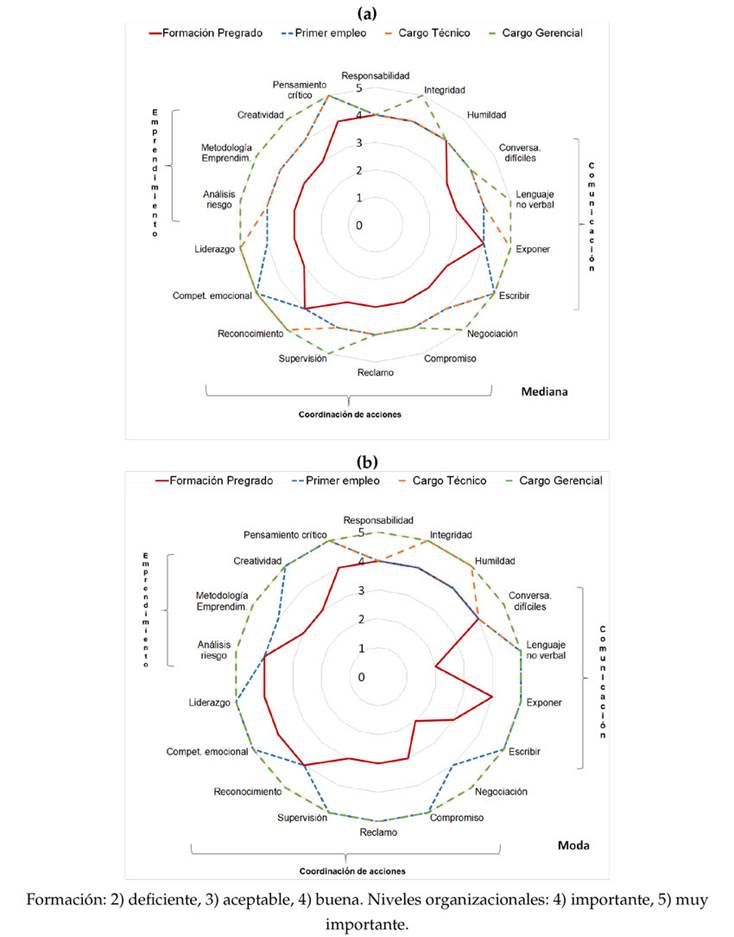
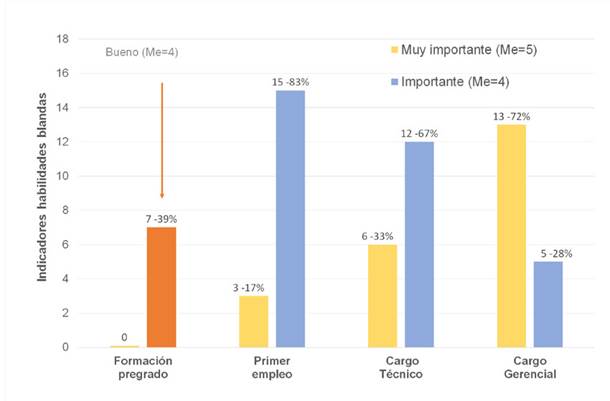
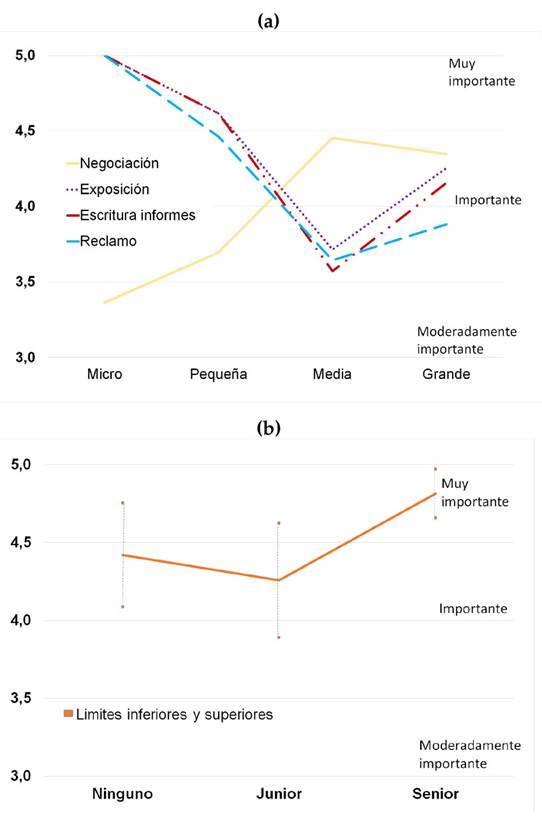
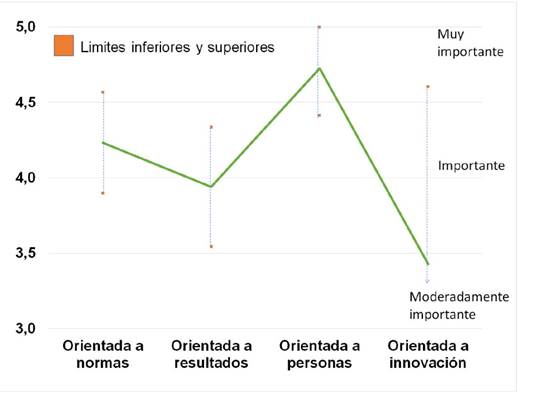



2.jpg)
